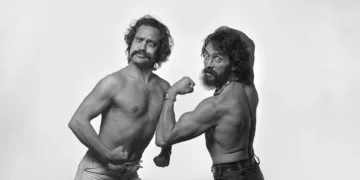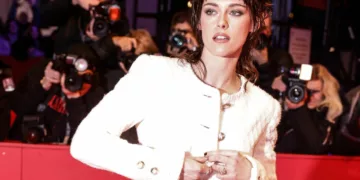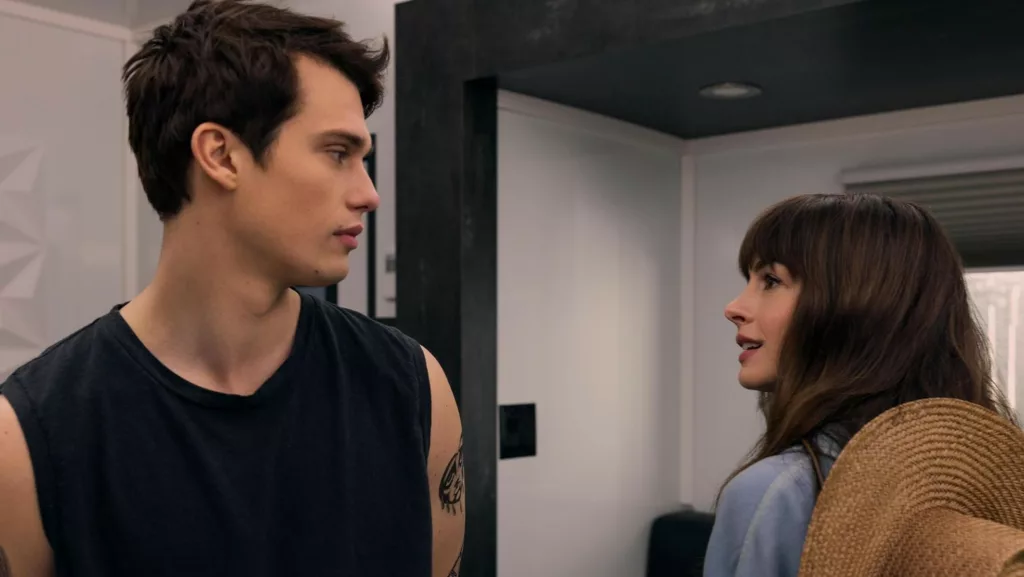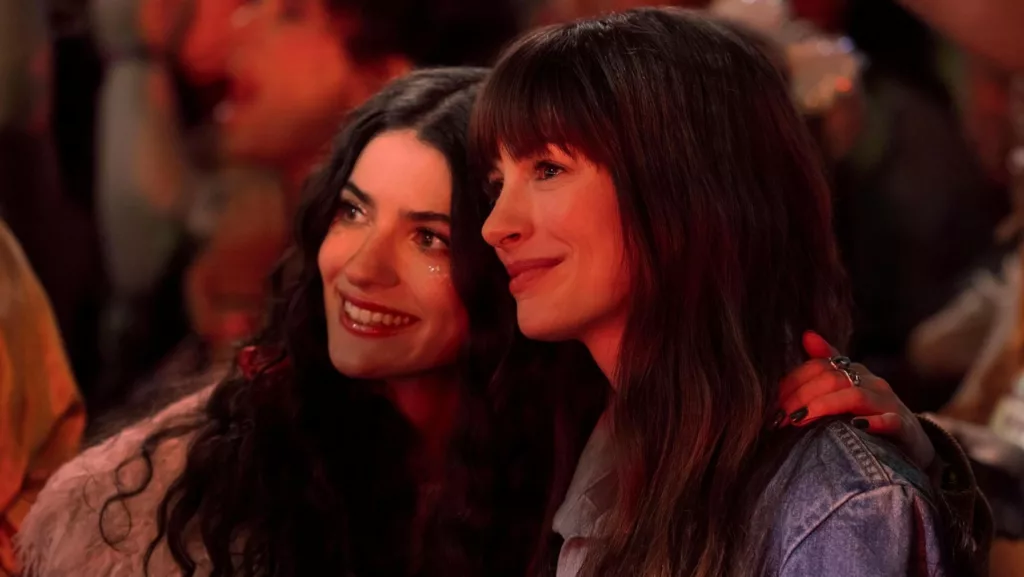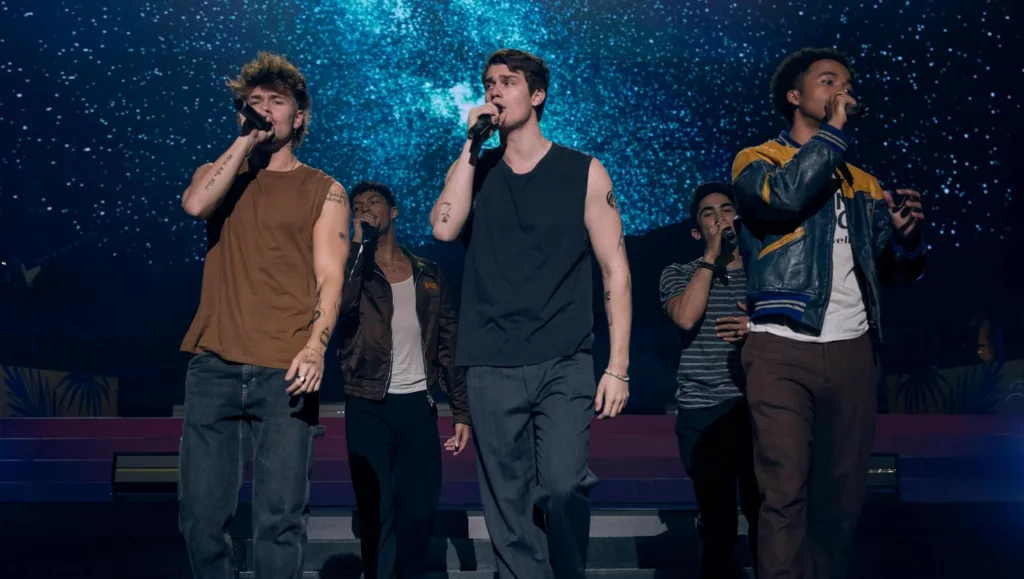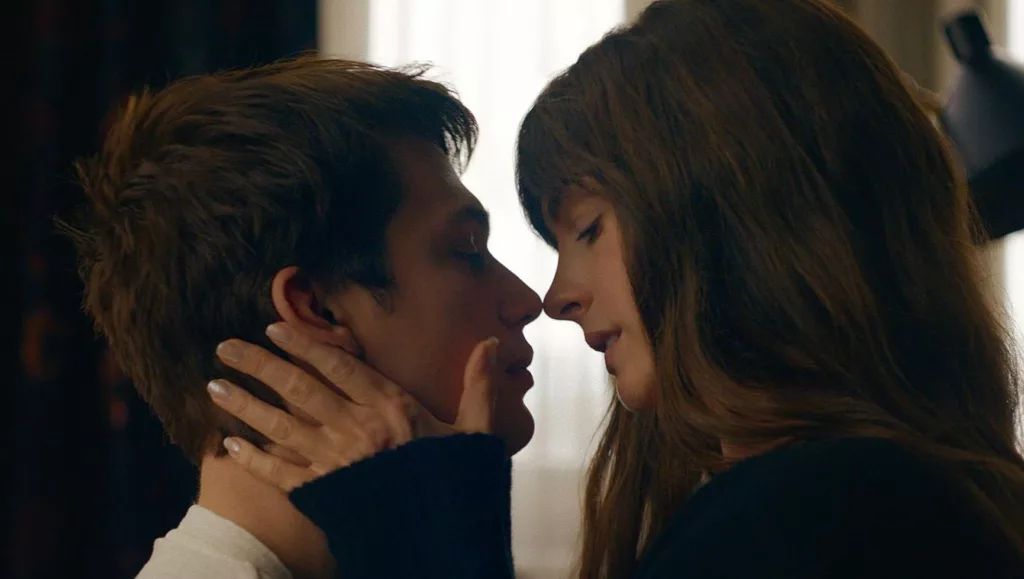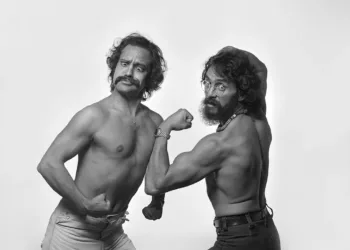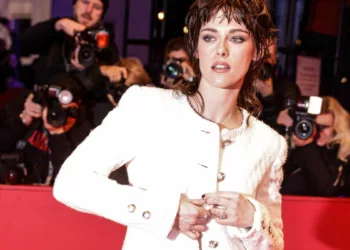“The Idea of You” disrupts conventional romantic comedy tropes by presenting an unorthodox central romance – the story of Solène, a 40-year-old divorced mother, and Hayes Campbell, a 24-year-old world-famous pop star she encounters by chance. Their whirlwind love affair catalyzes introspection into the very notion of modern relationships, the limitations society rigidly enforces, and the resilience required to embrace one’s desires in defiance of judgment.
This Amazon Studios film does not merely tread the well-worn path of cliche romantic fantasies. Instead, it brazenly upends expectations by depicting a dynamic where the woman is the older, more grounded party, redefining herself after major life upheavals.
Meanwhile, her younger paramour, for all his material spoils, finds himself unmoored by sudden emotional intimacy outside the vacant limelight. Their polarized experiences feeding an unlikely yet crackling chemistry forms the propulsive heart fueling an examination of societal pressures smothering unconventional love.
Narrative Nutshell: Modern Romance, Unorthodox Complications
Solène Belleni (Anne Hathaway) is a 40-year-old divorced art gallery owner raising her teenage daughter Izzy in Los Angeles. When her ex-husband ditches plans to take Izzy to Coachella, Solène begrudgingly chaperones Izzy and her friends to the music festival instead. There, a comedic mishap leads to her meeting Hayes Campbell (Nicholas Galitzine), the young, handsome lead singer of chart-topping boyband August Moon.
Despite their near 20-year age gap, Solène and Hayes are immediately drawn to each other. After a whirlwind courtship, they embark on a passionate, globetrotting affair that gets complicated as the harsh glare of Hayes’ fame intensifies. His mega-fans viciously turn on the “older woman” dating their idol, and Solène grapples with fears that her new beau is merely infatuated with the “idea” of her rather than the reality.
With Izzy caught in the cruel crosshairs of high school bullying over the relationship, Solène faces gut-wrenching choices. Does she sacrifice her own shot at newfound happiness and self-rediscovery after divorce? Or does she press onward with Hayes, weathering the maelstrom of condemnation that their untraditional May-December romance has unleashed?
Cinematic Shepherding: Showalter’s Deft Guidance
Veteran comedic director Michael Showalter, whose previous hit “The Big Sick” adroitly balanced humor and heartache, brings a dually light yet impactful touch to this adaptation of Robinne Lee’s popular novel. His directorial choices effectively move the provocative central narrative along at a breezy yet substantive pace.
Showalter’s editing seamlessly integrates the film’s more fanciful romantic comedy elements with its thoughtful exploration of courting against societal constraints. Whimsical fantasy sequences depicting Solène’s interior mindset blend artfully with tender intimate moments and harsh public scrutiny. The pacing strikes a judicious balance between allowing the central couple’s chemistry to smolder and pushing the dramatic crux forward.
While some critics felt the fictional band’s music undercut credibility, Showalter’s keen focus on the core relationship dynamic between Hathaway and Galitzine’s characters remains the resonant constant. His fidelity to Lee’s thematic intentions is preserved, even as the adapted ending provides a nuanced, more hopeful resolution to Solène’s self-actualization journey. Under Showalter’s assured hand, “The Idea of You” celebrates uncommon love while grounding its aspirational escapism in recognizable emotional truth.
Performer Praisals: Hathaway Soars, Galitzine Shines
Anchoring the film with a soulful, emotionally textured performance, Anne Hathaway cements her status as one of the most versatile leading ladies of her generation. As Solène, the Oscar-winner radiates an effortless relatability and hard-won centeredness, depicting a woman redefining herself amid the ashes of divorce and empty nest uncertainty.
Hathaway’s exquisite work captures the grave introspection and apprehensions Solène experiences, even as she cautiously yet excitedly allows herself to embrace new passions. The legendary actress deftly imbues Solène with multi-faceted depth – a caring mother, a romantic rediscovering desire, and a self-possessed woman unafraid to prioritize her own happiness at long last.
As her paramour Hayes, the charismatic Nicholas Galitzine more than holds his own opposite the powerhouse Hathaway. The rising star portrays the fictional pop idol with an intriguing mixture of swagger, sensitivity, and soul that transcends mere boyband stereotypes. Galitzine’s magnetic screen presence attests to his leading man potential, and his palpable rapport with Hathaway authenticates their romance’s intense yet star-crossed nature.
The supporting players, particularly Ella Rubin as Solène’s daughter Izzy and Reid Scott as her caddish ex, provide able audience surrogates and emotional anchors amid the grand romanticism. However, it is the central pairing’s natural, lived-in chemistry that makes “The Idea of You” ultimately convincing rather than mere escapist fluff.
Thematic Excavations: Defying Norms, Embracing Truth
While depicting a glamorized, globetrotting romance between a world-famous musician and a single mother, “The Idea of You” uses this fantastical premise to delve into resonant real-world issues. Chief among them is society’s paradoxical judgment of unconventional age-gap relationships when the woman is older than the man.
Through Solène and Hayes’ union, the film spotlights the sexist double standards that still exist. When older male celebrities date younger women, it’s shrugged off or even celebrated. But this movie asks – why is the reverse generally seen as salacious or predatory? Solène repeatedly confronts the misogynistic vitriol of Hayes’ fanbase who deride her as a “cougar” or desperate for robbing their idol’s youth.
Yet rather than cheap moralizing, “The Idea of You” depicts Solène’s powerful self-actualization after years of disappointment. Her arc boldly defies the notion that women, especially mothers, must discard their own desires for happiness once entering their 40s. In this sense, the film shares spiritual DNA with feminist dramedies that reject traditional notions of when women supposedly become “expired goods.”
The movie’s nuanced examination also extends to celebrity culture and the dark side of music idolatry. In an era where artfully cultivated parasocial relationships between stars and fans proliferate, “The Idea of You” ponders the psychological toll on performers treated as mere projections for others’ ideals. When Hayes’ human vulnerabilities and needs clash with fans’ perceptions, it yields toxicity from those unable to separate reality from their painted fantasy.
Ultimately, by contextualizing its central romance around these resonant societal ills, “The Idea of You” elevates itself beyond mere escapism into a work of cultural observation. It persuasively argues that love, self-love especially, should conquer all arbitrary limitations society imposes.
Production Praisals: Immersive Artistry Elevates the Escapism
From a technical craft perspective, “The Idea of You” represents lushly rendered big-screen escapism of the highest order. The cinematography by Brandon Trost captures the grandeur of the film’s globe-spanning locales with a vibrant, Instagram-ready pop aesthetic that mimics the best concert tour visuals.
Production designer Kalina Ivanov’s work whisks viewers from the pulsating neon-lit chaos of Coachella to the luxurious environs of Solène and Hayes’ European hideaways with seamless visual immersion. Each backdrop is distinctly curated to reinforce the thematic contrasts between their characters’ respective worlds.
Composer Jamie Goldstein’s melodic score complements the effervescent tone, while the original pop tunes by hitmaker Savan Kotecha for Hayes/August Moon’s repertoire boast remarkable earworm potency. The vividly staged concert sequences burst with kinetic energy and spectacle worthy of legitimately chart-topping acts.
Though clearly designed as a glossy, sumptuous indulgence, the technical achievements undergirding “The Idea of You” elevate the material beyond disposable fluff. The artistic merits enmesh to create a fully inhabited, tangible fantasia that transports audiences into its central couple’s heightened romantic reality – even as its thematic underpinnings remain grounded.
Enduring Impressions: A Textured Romantic Transcendence
While certainly uneven in patches, “The Idea of You” largely succeeds as both a frothy romantic escape and an incisive exploration of societal mores around love, aging, and female self-actualization. Director Michael Showalter’s assured touch and Anne Hathaway’s grounded yet luminous performance as Solène elevate the film beyond tawdry cheesiness into a palpable celebration of hope and personal truth.
For all its indulgent fantasy trappings, the movie’s insights around misogyny, parasocial obsession, and the resilience of the human heart resonate with sobering, uncommon perspicacity for the genre. Like any profound romance, real or imagined, “The Idea of You” persists in imploring us to shed artificial limitations in pursuit of transcendent emotional connection – with others, but most importantly, with ourselves.
The Review
The Idea of You
"The Idea of You" transcends its fluffy romantic premise to become a surprisingly insightful and emotionally resonant meditation on love, sexism, self-discovery and the perils of fame. Anchored by Anne Hathaway's soulful performance and Michael Showalter's deft balance of fantasy and harsh reality, this cinematic confection satisfies as both a swoon-worthy escape and a culturally relevant exploration of society's paradoxical judgments. While not without tonal bumps, the film's tasteful indulgence in wish-fulfillment fantasy is grounded by its astute social commentary and full-bodied emotional truths about the struggles and triumphs of finding oneself. In the end, "The Idea of You" makes a compelling case for shedding the shackles of other's expectations to embrace the most radical act - unabashed self-love.
PROS
- Anne Hathaway's nuanced, powerful performance
- Thoughtful exploration of unconventional relationships and societal pressures
- Provides insightful commentary on sexism, celebrity culture, and music fandom
- Visually lush and immersive production values
- Blends escapist romantic fantasy with grounded emotional realism
CONS
- Nicholas Galitzine's performance doesn't quite match Hathaway's depth
- Tonal inconsistencies between the frothy and serious elements
- Fictional boyband isn't totally convincing as global superstars
- Tends to get overly expository at times

